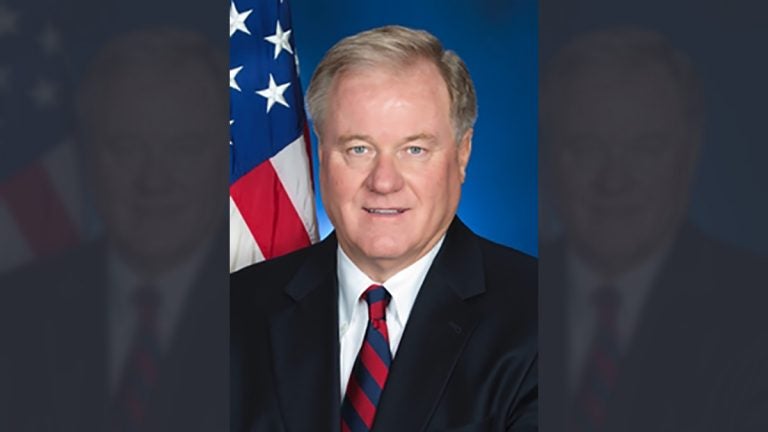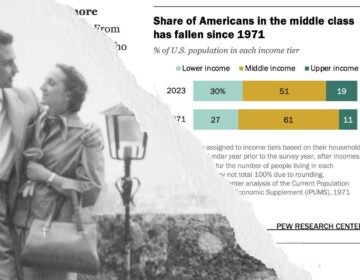A political sticking point is leading to more than 500 state layoffs in Pa.
Listen
Pennsylvania Sen. Scott Wagner
On Wednesday night, it was raining heavily in downtown York, Pennsylvania. But the weather did not deter about a dozen people carrying union signs as they protested outside the district office of Republican Sen. Scott Wagner.
Many of the protesters work in the state’s unemployment compensation program — at least, they do for now. Come Dec. 19, an estimated 521 of them will be being laid off due to a funding deficit.
Jennifer Mascaro, a protester whose husband is among the workers facing furlough, said the past several weeks have been a nightmare.
“We have a daughter going to college. [That’s] going to hurt,” she said. “I’m going to college. Got to figure out how to pay for that … it’s going to hurt a lot of people’s futures.”
The layoffs were announced after the Senate opted not to vote for a proposal that would’ve tacked a year to a funding stream allocated to the program several years ago.
Wagner — a first-term senator — has taken credit for leading the charge against the bill, thus the protests outside his office.
In a statement addressed to the protesters, Wagner said neither he nor the Senate leadership is responsible for the impending layoffs; he said that the Wolf administration is using money irresponsibly.
“Your union, which you pay dues to, should even be considering some type of legal action to force Gov. Wolf to halt the closure of the call centers,” he said in a video address. “But, in fact, your union has you standing in front of my office holding a sign. Your union cares more about protecting Gov. Wolf politically than they do about protecting your jobs.”
The rest of the Senate’s GOP leadership has also taken that stance, saying the governor didn’t offer a clear enough plan for the funding.
But Wolf and Democrats in the legislature said that’s just an excuse. So did the union that represents many of the furloughed workers.
Stephen Catanese, with SEIU Local 668, said the situation didn’t have to turn into such a big issue.
“It’s hard to be optimistic when something so simple and easy to do — for whatever purpose of grandstanding or intransigence — can’t even get an up or down vote to not break the unemployment system,” he said. “So I would like to be optimistic, but I think things are going to get bad. I hope not, but … I have my worries.”
Who’s in the right?
There is really no easy answer. The issue dates back to 2012, when the state established a service infrastructure improvement program to help pay for computer system upgrades. The funding was intended to help maintain decent service in unemployment compensation centers around the state during those upgrades.
It was intended to be a four-year cash stream. But Pennsylvania Department of Labor and Industry spokeswoman Sara Goulet said the program needs at least one more year of funding in order to finish its upgrades.
Specifically, she said, the agency was reluctant to hurry into a contract to update the computer system.
“The department made the decision to say, ‘OK, we’re not going to hurry into a contract with someone who can help us with this modernization, we’re going to take our time,'” she said. “We’re going to do some consulting, we’re going to really look at how we can best do this most efficiently, most effectively, and not go over budget on it. And I feel like we’re sort of being punished for that.”
The governor’s office said it first broached the funding extension in April of this year. An initial request sought an additional four years of funding, although the final bill would only have added one.
In the months following the move, administration spokesman Jeff Sheridan said the governor ultimately sent the Legislature six documents, variously describing how the previous funding had been spent, and why more was warranted.
He said “countless” meetings were held.
“They can say all they want that they didn’t receive the necessary information that they requested from us,” Sheridan said. “But the governor outlined a very comprehensive six-month timeline of information that was provided, on the request of the Senate, to them. It is untrue that they did not receive the information that they asked for on several different occasions.”
The Senate GOP contends that the administration’s proposals were always too vague.
Jenn Kocher, spokeswoman for the Senate Republicans, said for instance that the chamber asked for a date by which the unemployment compensation program would no longer need the funding stream, and never received it.
“We were looking for a plan,” she said. “These are all very nice sentences that talk about high-level things, but nowhere is there a plan.”
Meanwhile, in unemployment compensations offices around the state, more than 500 employees are preparing to be out of a job.
Laurie Haines, an adjudication supervisor in the department, has worked there for 16 years. She said it feels like workers are being used as tokens, like political collateral.
“My thing,” she said, “is that it should be people over politics.”
The night of the rally was also the last day of the 2016 legislative session — the absolute latest the Senate could have voted on the funding bill.
Haines and her fellow protesters said they weren’t really expecting a vote. But she said the situation does feel more hopeless now.
“Frustration, hurt — we’ve become family,” she said. “And now, after so many years, we’re going to lose that … it’s everyone possibly losing their homes, their cars. I mean, this was our livelihood for so long.”
Goulet said the layoffs will disproportionately affect staff in the state’s seven unemployment compensation service call centers.
Fewer employees will probably mean longer wait times for callers, she said.
So far, no alternative plans have been proposed for avoiding layoffs.
WHYY is your source for fact-based, in-depth journalism and information. As a nonprofit organization, we rely on financial support from readers like you. Please give today.





